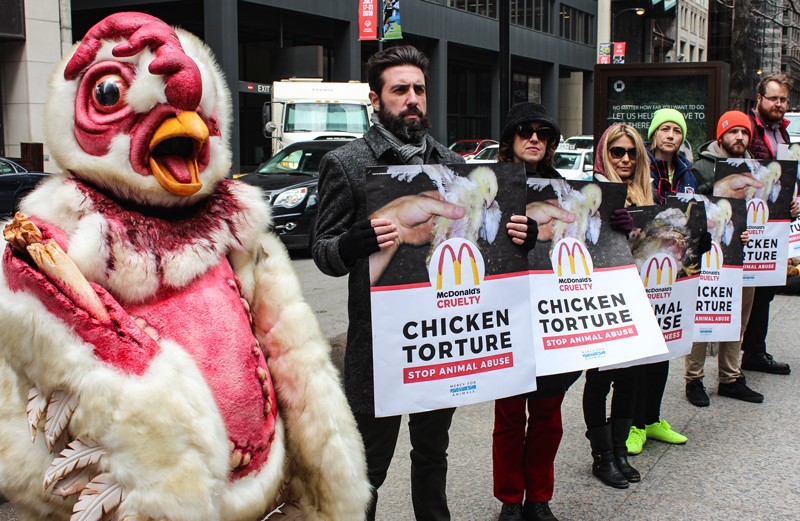In the vast landscape of fast food giants, few names resonate as loudly as McDonald’s. This ubiquitous brand, heralded for its convenience and quick service, serves billions of customers daily. However, beneath its golden arches lies a disturbing narrative—one steeped in the complex realities of animal agriculture and the ethical implications of our food choices. The enchanting facade of a crispy fry or a juicy burger belies a much darker connection to systemic animal cruelty.
To understand McDonald’s relationship with animal welfare, we must first traverse the intricate pathways of its supply chain. The company, like many others in the fast food industry, relies heavily on a network of farms that prioritize efficiency and profit over the humane treatment of animals. These intensive farming practices, often dubbed factory farming, are characterized by overcrowded conditions, lack of veterinary care, and a profound neglect for the intrinsic needs of the animals. Chickens, pigs, and cows are reduced to mere commodities, their lives measured in productivity rather than worth.
For instance, the broiler chickens that grace McDonald’s menus grow unnaturally fast, reaching slaughter weight in mere weeks. This biological manipulation, driven by consumer demand for cheap meat, results in severe health issues for these birds. Suffering from leg deformities and respiratory complications caused by poor living conditions, they spend their short lives in a perpetual state of discomfort. The seductive appeal of chicken nuggets is tainted with the knowledge that these animals endured intense suffering before arriving on our plates.
Moreover, the dairy industry, which supplies McDonald’s iconic milkshakes, faces its own ethical quandaries. Cows are subjected to a cycle of forced reproduction to ensure a continuous supply of milk, only to have their calves taken away shortly after birth. This separation engenders profound distress, as the maternal bond is severed for the sake of profit. The sorrowful cries of mother cows resonate in the echelons of the dairy industry, echoing the emotional anguish that remains largely unnoticed by the average consumer. It is a heartbreaking reality that starkly contrasts with the delightful imagery often portrayed in advertisements.
While McDonald’s has publicly committed to implementing higher welfare standards, critics argue that these pledges often lack transparency and rigor. The company’s reassurances about sourcing “humanely raised” ingredients are frequently scrutinized, as many consumer advocates highlight that these qualifiers are open to interpretation. Terms like “cage-free” or “free-range” can veil a multitude of sins—misleading consumers into believing they are making compassionate choices while the underlying atrocities remain obscured.
The notion of ethical food choices is thus rendered fraught with perplexity. As consumers, we grapple with the tension between convenience and conscience, frequently finding ourselves navigating a maze constructed of conflicting messages. How can one reconcile a craving for a Big Mac with the knowledge of animal suffering? The juxtaposition presents a formidable ethical dilemma that has yet to see a universal resolution. What is the price we are willing to pay for a momentary indulgence?
In the consumer-driven world that revolves around fast-food convenience, it is crucial to recognize the purchasing power we wield. Every choice we make at the register sends ripples through the industry. By opting for sustainable, cruelty-free alternatives, we can catalyze change. Numerous organizations and brands are gaining traction, prioritizing humane practices and transparency in animal welfare. By supporting these alternatives, we not only align our eating habits with our ethical values but also signal to larger corporations that the appetite for compassion is growing.
The allure of fast food is undeniable, tantalizing the senses and providing comfort in our busy lives. Yet, the temporary satisfaction derived from these meals can no longer overshadow the moral implications they carry. The clamor for convenience must not drown out the voice of the voiceless—the animals who endure unspeakable hardships in silence. The icons of the fast-food universe, like McDonald’s, may thrive under the golden arches for now, but it is incumbent upon us to illuminate the shadows in which these animals suffer.
Imagine a world where the golden arches no longer symbolize merely fast food but rather a commitment to ethical responsibility. Envision the joy of munching on a meal devoid of guilt, knowing that every bite aligns with a humane ethos. Such a transformation begins with awareness—of what truly lies behind our fast-food choices and the far-reaching consequences of our consumption patterns. To be apathetic is to be complicit in the suffering of these sentient beings, and to be informed is to empower ourselves to act.
In a post-industrial society enamored with convenience, it is an unsettling truth that many food options come at a heavy cost. The challenge lies not just in uncovering these truths but in mobilizing a collective consciousness towards ethical eating. McDonald’s, while a titan in the fast-food industry, offers merely a mirror reflecting our choices, responsibilities, and potential for change. As consumers, we hold immense power to redefine what it means to dine well. Will we embrace the burden of our choices, or shall we allow the tempting allure of the quick fix to continue its cycle of cruelty?
The journey towards ethical food choices is fraught with challenges, yet it is incumbent upon each one of us to tread this path with intention. As we navigate the dense woods of our dietary decisions, let us not forget that beyond the allure of convenience lies a critical opportunity—to advocate for a kinder, more compassionate world.








